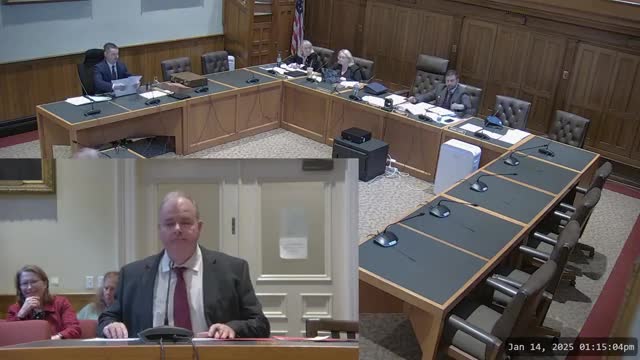Senate Judiciary hears emotional, divided testimony on SB 14 and SB 15 mandatory-penalty proposals for fentanyl offenses
Get AI-powered insights, summaries, and transcripts
Subscribe
Summary
Sen. Bill Gannon introduced SB 14 and SB 15 to the Senate Judiciary Committee, saying the bills are aimed at increasing penalties for fentanyl possession, distribution and distribution resulting in death in order to deter sellers and remove dangerous distributors from the streets.
Sen. Bill Gannon, sponsor of two related bills addressing fentanyl, told the Senate Judiciary Committee that SB 14 and SB 15 are intended to hold sellers accountable and reduce deaths related to fentanyl. "When a person is peddling this poison, they must be prosecuted and taken off of our streets," Gannon said while introducing SB 14 and later SB 15, which would create stiffer mandatory penalties when distribution leads to death.
SB 14, as described at the hearing, would create mandatory minimum terms for certain fentanyl possession and distribution quantities when a defendant has prior convictions: a 3½-year minimum for possessing or distributing 5 grams or more and a 7-year minimum for 28 grams or more were discussed in testimony. SB 15 would impose a mandatory minimum sentence (the bill text discussed by the sponsor set a 10-year term) for distribution of a controlled substance with death resulting.
Supporters included Manchester Mayor Jay Ruway, who described local impacts of the opioid crisis and cited city overdose figures: "By establishing a mandatory minimum sentence of 3 years and 6 months for those convicted of possessing 5 grams or more of Fentanyl, and sentences of 7 years in prison for those convicted of possessing 28 grams, we have even more ammunition to combat this gorge on our streets that has ruined too many lives and stolen too many futures," he said, adding Manchester saw decreases in overdoses in 2024 amid expanded prevention and treatment efforts.
Sean Karkos, assistant county attorney in Hillsborough County and lead of the office's drug-prosecution unit, testified that the bill is narrowly written to apply to defendants with prior convictions and where prosecutors can show intent to sell; he said that many death-resulting prosecutions he sees involve fentanyl and argued mandatory minimums will deliver a stronger general-deterrence message. "If you were convicted of that killing somebody by selling them a drug that you knew could have killed them, I think there needs to be a mandatory minimum sentence," Karkos said.
Opponents included criminal-defense attorneys, treatment providers, recovery specialists, and civil-rights advocates who argued the bills are overbroad, risk punishing people with substance use disorder, and would increase prison costs without evidence of reduced overdose deaths. Melissa Davis of UNH Law, representing the New Hampshire Association of Criminal Defense Lawyers, said mandatory minimums do not deter people with substance use disorder and would remove judicial discretion: "Mandatory minimum sentencing is contrary to the science of addiction," she testified, and she provided a fiscal figure for incarceration costs of a 3½-year sentence that she said could approach $190,351 per person.
Several recovery providers and peer specialists said people with significant tolerance can consume multiple grams, and caution that a 5-gram threshold can include heavy personal use rather than distribution. Dan Wargo of TLC Recovery Programs said his staff — all in recovery — reported personal possession at the 5-gram level in their histories, and warned mandatory minimums would remove people from the recovery workforce. ACLU of New Hampshire Executive Director Devon Chaffee and other civil-liberties witnesses urged rejection of mandatory minimums on effectiveness, cost, and separation-of-powers grounds.
Witnesses and committee members debated factual points — how often dealers are present when overdoses occur, whether federal prosecutions already capture large importers, and the evidentiary difficulty of proving a particular sale caused a particular death. Prosecutors noted these cases are rare, difficult to prove beyond a reasonable doubt, and that text messages, phone records or confessions are often key evidence.
No committee vote was taken at the conclusion of the public hearing. Multiple witnesses urged alternatives: strengthen prevention, treatment, recovery services and harm-reduction measures such as naloxone distribution; others asked that any statutory mandatory minimum include a narrowly drafted cooperation exception for confidential informants and cooperating defendants to protect investigations.
The hearing included personal, often emotional testimony from family members and people in recovery who described the human toll of fentanyl deaths as well as differing views on how best to reduce overdoses.
